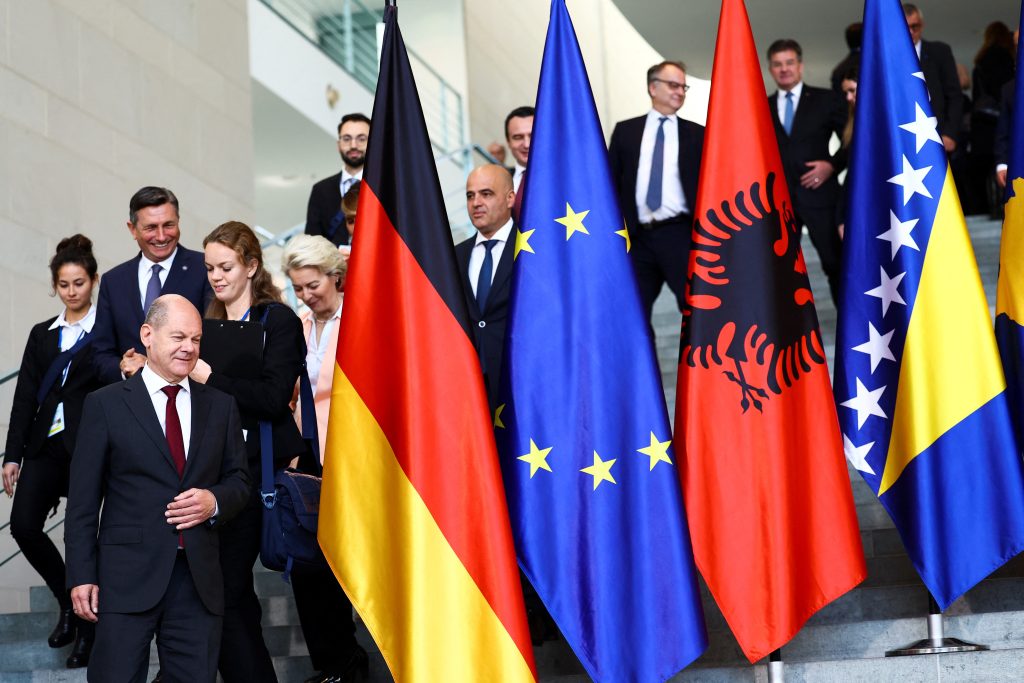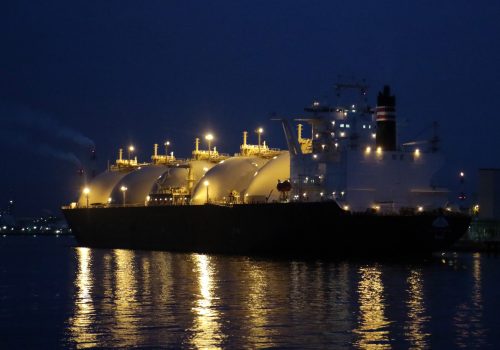On Thursday, the prime ministers of the six Western Balkan countries met in Berlin to sign three important agreements – on the mutual recognition of identity cards, academic degrees and professional qualifications – as part of a “Berlin process » revitalized. This signing constitutes a significant step in rebuilding the dynamics of regional economic cooperation and integration, and constitutes a signal that the countries of the European Union (EU) are once again focusing on the Balkans, shadow of Russia’s ruinous invasion of Ukraine. This attention is paying off. And it couldn’t come at a more important time.
German Chancellor Olaf Scholz has vowed to get the EU enlargement process back on track, promising to make the future of the Western Balkans a foreign policy priority for his government. “The stability and prosperity of your region cannot be separated from the stability and prosperity of Europe as a whole,” Scholz said at the summit.
Enlargement hit a roadblock in 2019, when France blocked the opening of negotiations for Albania and North Macedonia, with President Emmanuel Macron demanding reform of the enlargement process before considering new members. This came just after North Macedonia settled its long-standing name dispute with Greece, in the hope that the compromises would open its way to the EU. As soon as new European procedures were drawn up and adopted and Macron dropped his objections, Bulgaria blocked the opening of North Macedonia’s candidacy for obscure reasons related to language and history – and finally give in last May when France finally negotiated a compromise. Thursday’s summit was a serious attempt to build on this progress.
The EU enlargement program needs all the help it can get. Although there was A plot writing As for how the EU committed to granting Ukraine and Moldova candidate country status in the shadow of Russian aggression, the reality is much less sunny. Many EU countries have long pledged to slow down the process. And in private conversations with political and civil society leaders across Europe this year, we have heard concerns expressed that little has actually changed. Indeed, we have the feeling that with Ukraine and Moldova, the EU is making promises that it is not able to keep.
The Western Balkan countries’ broken promise of EU membership was first extended in Thessaloniki in 2003. While it is true that the necessary democratic reforms, notably in media freedom and state by law, are at a standstill in the region, it is also true that EU member states have shown real political hesitancy towards enlargement – and people on the ground in the Balkans can feel it. “They say they want to let us in, and we say they want to reform,” is a common refrain from discouraged activists across the region. Many supporters of enlargement across the EU worry that a similar mistake was made earlier this year by raising unrealistic hopes in kyiv and Chișinău.
The main role of Berlin
In this context, Germany’s renewed commitment to the Western Balkans should be applauded and welcomed. Given that effective membership is still a long way off even in the most optimistic scenarios, Scholz has focused his energies on reviving efforts to establish a regional common market (RCM) to implement the “four freedoms”: freedom of movement of goods, capital, services and people – throughout the region’s economies, based on European standards. This would go a long way in preparing the region for full membership, it is believed. It will also bring tangible benefits to the region’s citizens by creating a more attractive destination for Western capital, especially as global supply chains struggle to adapt to countries’ short- and long-term political imperatives. friend-shoring. The agreements signed this week represent a significant step in restoring the initiative, which failed due to disputes between Serbia and Kosovo at the Berlin Process summit in Sofia in 2020.
The Berlin Process was launched by German Chancellor Angela Merkel in 2014, at a time when hopes for enlargement were beginning to fade. He was criticized for talking big but producing little. Early efforts to establish the CRM resulted in a deal guaranteeing free cellular roaming across the region – and little else. Transformative investments in infrastructure, an important part of the initiative, have not materialized in any meaningful way and suffered from delays in matching funds to projects.
But the annual calendar of Berlin Process summits has generated a previously rare resource: shared political awareness and familiarity among the region’s leaders. When tensions and disputes halted the progress of the MRC in Sofia (with Kosovo refusing to sign agreements allowing Serbia to persist in not recognizing its statehood), three of the six countries in the region – Serbia, North Macedonia and Albania – have made progress in realizing the four freedoms. between them.
Launching the Open Balkan initiative last year, the three countries made progress by signing several agreements. The implementation of measures that would allow citizens to work freely in any of the three participating countries is currently blocked in the North Macedonian parliament. But expedited customs “green lanes” for transporting goods between the three have been opened, and tourism and cultural exchanges have increased. The thaw between Serbia and Albania was most pronounced, but relations between Serbia and North Macedonia also warmed significantly.
A cottage industry sprung up among think tanks and civil society, with people wondering whether the Open Balkan represented a dangerous alternative to European mediation efforts such as the Berlin Process, or whether it was a a healthy sign that the region was maturing and taking initiatives of its own. In their efforts to revive the Berlin process, the Germans have admirably avoided this ultimately academic debate. They renewed their efforts to use the EU’s institutional weight to move forward with the six countries. If a subset of countries takes a head start on their own initiative, so much the better, provided that their integration efforts are fully in line with European standards.
Politics at the forefront
During our conversations in Berlin this fall, we were told that the big lesson learned from previous cycles was the importance of policy commitment, particularly on the European side. Progress in European integration can no longer be treated as a simple technocratic problem, a matter of sequencing reforms in the right way. The political commitment of the region’s leaders will be met and tested by mutual political goodwill at the highest levels on the European side. To move things forward, both parties will have to do their part. Scholz’s personal commitment, both during the preparation and during the summit, testifies to this new approach.
And this level of commitment will be necessary to tackle the problems looming on the horizon. Next winter’s deprivations will likely strain the economies of this impoverished region. EU leaders, aware of the poor integration of the Balkans into the continent’s response to COVID-19 (and the residual bitterness this experience has engendered), are keen not to repeat the mistake. Immediate food and energy needs were discussed in Berlin this week, as were ambitious plans to finance the region’s transition to a more sustainable and greener energy mix.
The agreements signed this week are an important and long-awaited step in the right direction. Follow-up will be very important. The next Berlin Process summit will be held in Tirana and the 2024 edition in Vienna. And progress will not only be measured by the region’s integration, but also by the resolution of outstanding disputes, notably between Serbia and Kosovo. “It is high time to overcome the regional conflicts that have lasted for far too long – conflicts that divide you and hold your countries back on the European path,” Scholz said on Thursday. Serbia’s reluctance to fully align with the EU’s common foreign policy towards Russia is another bone of contention. Expect political pressure to mount on Belgrade even as Europe opens its coffers to help the region through difficult times.
The most encouraging sign is that Europe appears to have adopted a political commitment. The Berlin Process will succeed if it is used as a tool for problem solving and action in the region. Changes must be visible and not just felt after the fact. Summit visibility is an important element of success, but it alone is not a magic formula. There is still a lot of work to be done.
Damir Marusic is a resident senior fellow at the Atlantic Council’s Europe Center and works on the Council’s Balkans Forward Initiative.
Maja Piscevic is a non-resident senior researcher at the Europe Center and the Council’s representative in the Western Balkans.
J.örn Fleck is the acting director of the Europe Center.
Further reading
Thu June 30, 2022
The war in Ukraine and gas in the Western Balkans
Energy source
By
Robert F. Ichord, Jr.
Russia has made inroads into the Western Balkans thanks to its promises of abundant gas supplies. The EU and NATO must understand the strategic value of the region and work to promote efforts to diversify gas imports from alternative suppliers and build an extensive gas infrastructure network.
Image: German Chancellor Olaf Scholz, European Commission President Ursula von der Leyen and other participants walk past a family photo at the Western Balkans Summit at the Chancellery in Berlin, Germany, November 3, 2022. REUTERS/ Lisi Niesner



